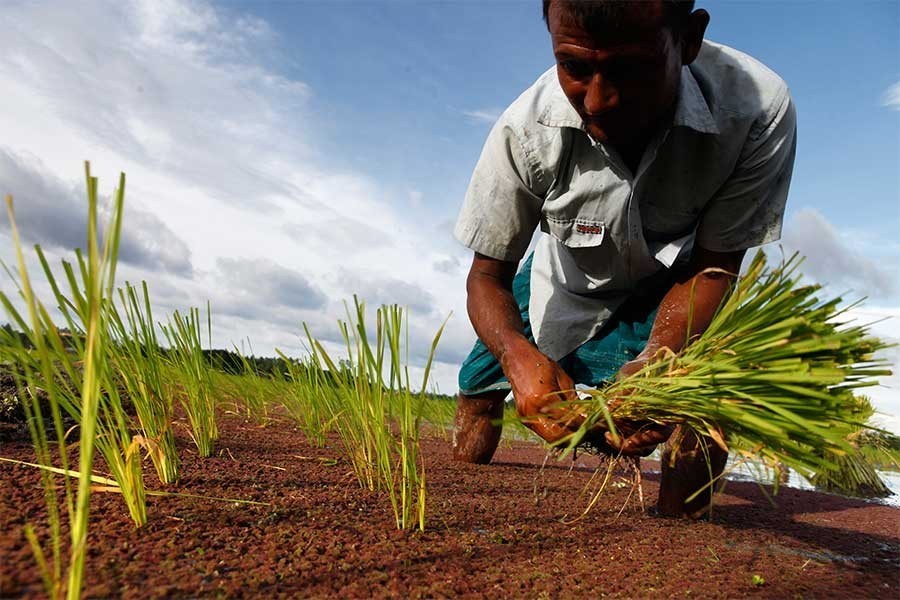
Published :
Updated :

The World Food Programme's (WFP's) latest prediction is dire: 265 million people in the low and middle-income countries may suffer acute hunger by the end of this year. This is almost double the number the Global Report on Food Crises 2020 estimated at 135 million who are now facing acute hunger in 55 countries on account of armed conflicts, effects of climate change and economic crises.
Lives and livelihoods have been threatened further by coronavirus on its second wave of rampage so that globally more people are joining the rank of the hungry. How does Bangladesh fare in this context? Unless the country achieves herd immunity by inoculating at least 70 per cent of its population, which according to the World Bank will not happen before June next year, lives and livelihoods here will continue to be vulnerable. This again is against the background of the second wave of the pandemic. What if a possible third wave also steamrolls the country before June 2022!
Bangladesh can expect a good Boro harvest despite some crop losses in some areas. In fact, more areas than the target were brought under Boro cultivation. The production target of 20.5 million tonnes is most likely to be achieved. If this is encouraging, other developments on the food front are not equally reassuring. Food stock in the government's warehouse has dropped to a record low at 0.298 million tonnes which during the corresponding period last year was at 0.90 million tonnes. Also poor procurement during the Aman paddy season has only put further pressure on the stock. Against a target of 0.85 million tonnes of food grains, only 0.083 million tonnes could be procured for government stock then.
So the government had to make alternative arrangement for replenishing its dwindling stock, in which task the drive cannot be said to have met with great success. So far 0.908 million tonnes have been imported against a set target of 1.55 million tonnes of rice for the current fiscal year through both government and private channels. Volatility of the rice market cannot be arrested because of the sluggish move to build a reasonably healthy stock of food grains.
Already the government has announced increases in procurement prices of paddy and rice. This year the government will buy a kilogram of paddy at Tk 27 ---an increase of Tk 1.0 over the last year's Tk 26 and a kilogram of rice from millers at Tk 40 which is higher by Tk 4.0 than the previous year's price of Tk 36. Millers have reasons to be satisfied but will it be enough for farmers?
How the arithmetic behind this 1:4 has been done is not known. But a comparative analysis may be helpful. Supposing that 27 kilograms of rice is obtained from 40 kgs of paddy on an average, it is by no means 1: 4; it can at best be 1: 3. Let's put it another way: a farmer will get Tk 40 more for 40 kgs but a miller will receive Tk 27X4 =Tk108. Once again, the organised group benefits more than the unorganised farmers. To ensure food security at its optimum the best way is to incentivise the growers who feed the nation, not the intermediaries and the commercial intriguers.
Then again, intermediaries and millers or traders are responsible for volatility of rice market. There is no guarantee they will cease to play the game if they can sense the government will not be able to intervene in the market with its poor stock. Also where market mechanism does not work and farmers are at a disadvantage, millers and their hired intermediaries will leave no opportunity to slip for exploitation of farmers. They will not pay the price fixed by the government.
Quarters that lie in wait to skyrocket prices of items enjoying higher demand during the holy month of Ramadan can hardly be trusted. Apart from a brief spell when demand for such items fell sharply during the early days of lockdown, prices were lowered to some extent but now they are out to raise those. Already cooking oil and some other commodities have become dearer notwithstanding the government's warning against it.
How traders take undue advantage of a situation is best explained by the intrigues they take recourse to in watermelon trade. The authority concerned had to threaten punitive action against selling this fruit by its weight. The fact is, traders purchase watermelon on the basis of a hundred at Tk 500-700. This means the price for this juicy fruit they pay to a farmer is between Tk 5.0 and 7.0. But taking advantage of Ramadan, they started selling it at the rate of a kilogram. If a watermelon weighs five kgs, it will cost Tk 250 at the rate of Tk 50 a kg and Tk 300 at the rate of Tk 60 a kg. This is outrageous.
Farmers or growers are thus deprived of fair prices almost at all points. It is because of this the government should have a mechanism to help farmers in marketing their produces to where the demand is high. To this end the government can build up a fleet of trucks or wagons for transportation of perishable and other items or extend loans under a cooperative system for farmers to have their own transports.


 For all latest news, follow The Financial Express Google News channel.
For all latest news, follow The Financial Express Google News channel.